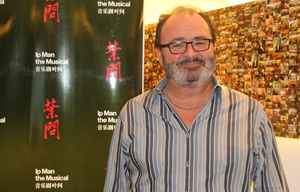Music proves a two-way street for promoter
Updated: 2013-05-01 14:30
By Mike Peters (China Daily)
|
||||||||
For the Shanghai Expo in June 2010, Mackridge brought "our Zulu Marimba band as well as our African drummers, dancers, Moyo face-painters and gum-boot performers as well as our 'Township' Pantsula (street) dancers. Our audiences at the Expo increased from an expectant few on day one to well over 6,000 after day two," he says. "We performed twice a day, afternoon and evening."
He was back at the Expo's Africa Square in August with an interactive drumming team, where his team handed out more than 100 drums and "boom whackers" at each show. Mackridge was perforning on drums. "In a nutshell, we had six different groups and genres, all highly appreciated by our Chinese audiences. For the Suzhou/Beijing festival, we incorporated a group of Scatamiya (a capella) singers from Cape Town."
While he's rhapsodic about Shanghai, "each of the cities that we visited brought its own splendor: the giant pandas of Chengdu (not to mention the spicy food). Shanghai's beautiful Huangpu river. Its vast and colorful bridges. The Bund. Suzhou's sheer beauty. Beijing's wonderful Forbidden City and Great Wall. The splendor of the Zhangjiajie mountains. The sheer beauty of Hangzhou's West Lake I could go on and on!"
He can't say enough about the Chinese people he met "so absolutely kind, humble and hospitable". Fortunate to be in a business that's allowed him to see the world, Mackridge says when he's asked where he'd like to go if he could go anywhere in the world, "the answer is Shanghai, China!"
Mackridge came to expose Africa's music to China but the revelation worked both ways.
"I was given the gift of a CD pack, explaining and highlighting the many Chinese instruments, both contemporary and historic. Listening to this is my form of relaxation," he says.
"I have realized that even Chinese music has progressed rather dramatically. While we all expected the official Shanghai expo to feature the 'old', we were surprised to find that the music and singing were extremely contemporary, with a hint of the traditional."
The singing styles he and his musicians experienced were absolutely world class, he says. "While I enjoy adapting old songs to China," he says, referring to the Elvis covers he's written about the country, "I plan to write songs for each of the cities at which we have performed."
While such music exchanges have become common and influence both sides, he says indigenous music must stay true to itself.
"I sincerely hope that Chinese musicians of the future will not become too hung up on Western sounds and influences," he says. "The inclusion of traditional Chinese instruments in their contemporary music keeps it essentially Chinese. This should never change."
Some of his musicians are crazy about Chinese cuisine and has really taken to rice and the noodles. And when he comes to China with a group of African musicians, "we often bring samples over for our facilitators, the most popular being our 'biltong' (beef jerky) and South African chocolates. I have also taken over mini bottles of South African brandy which the Chinese guys absolutely adore. Our dream is to introduce them to the wonders of the South African 'braai' (barbecue).
|
|
|

 'Taken 2' grabs movie box office crown
'Taken 2' grabs movie box office crown
 Rihanna's 'Diamonds' tops UK pop chart
Rihanna's 'Diamonds' tops UK pop chart
 Fans get look at vintage Rolling Stones
Fans get look at vintage Rolling Stones
 Celebrities attend Power of Women event
Celebrities attend Power of Women event
 Ang Lee breaks 'every rule' to make unlikely new Life of Pi film
Ang Lee breaks 'every rule' to make unlikely new Life of Pi film
 Rihanna almost thrown out of nightclub
Rihanna almost thrown out of nightclub
 'Dark Knight' wins weekend box office
'Dark Knight' wins weekend box office
 'Total Recall' stars gather in Beverly Hills
'Total Recall' stars gather in Beverly Hills
Most Viewed
Editor's Picks

|

|

|

|

|

|
Today's Top News
Shenzhou X astronaut gives lecture today
US told to reassess duties on Chinese paper
Chinese seek greater share of satellite market
Russia rejects Obama's nuke cut proposal
US immigration bill sees Senate breakthrough
Brazilian cities revoke fare hikes
Moody's warns on China's local govt debt
Air quality in major cities drops in May
US Weekly

|

|









